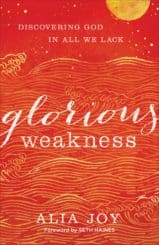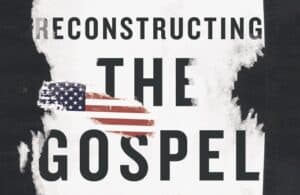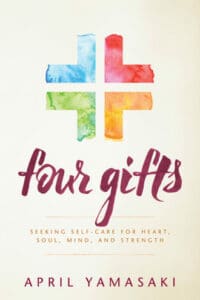
I remember reading the book of Ruth as a new Christian, and I came to the verse where Naomi says, “The Lord’s hand has turned against me” (1:13 NIV). I thought, You can’t talk to God like that. It seemed blasphemous somehow. Shouldn’t she have been a stronger believer who trusted God even in the face of such loss? Especially since her daughter-in-law was watching her relationship with God. Isn’t Naomi being a bad witness? Wouldn’t it have been a more powerful story if she was widowed and lost both of her sons and was a destitute foreigner, but she told Ruth not to worry because God was faithful and would provide for them? Wouldn’t the steadfast thing have been to tell Ruth that God is good and they had nothing to worry about?
Shouldn’t she have been a stronger believer who trusted God even in the face of such loss? Isn’t Naomi being a bad witness?
I didn’t understand it then, but years later, when I had endured a different measure of grief, loss, and suffering, I saw something different. I saw a woman who didn’t stop praying even when her words were bitter. I saw a woman who still calls God Yahweh, admitting that he is constant, the great “I Am.” Naomi remains in covenant with Yahweh and travels back to Bethlehem. She acts in faith even though her heart is broken and frustrated. She is achingly honest about her emptiness and need. God wanted her lament to bind her to him.
In lament, we find language that boldly comes before God and trusts him to show his face. To cover us and guide us and ransom us. To fight our enemies and restore the barren places. In lament, we acknowledge we are powerless to fix it. The good news is God never asked us to. We cry out from blood-soaked asphalt and hospital beds, from grave sites and war zones where artillery shells have punctured so much more than the rubble at our feet. We cry out over empty cribs and jail cells, from protest lines and church pews. We cry out after biopsy results and making the side of a bed that will never be slept in again.
Lament is subversive, always lifting from the breasts of the suffering; it’s always born in pain. Our tongues swollen with agony. It is the untamed cry of our hearts. The truth of our witness. We are not called to housebreak this truth or make it more palatable by neutering it and making it play nice and behave. The truth will not sit and fetch and stay, it demands to be unleashed. It is wild and dangerous. So often we’ve made an idol of image and the status quo. Sometimes the church is so busy scurrying around trying to protect our testimonies that we’ve failed to bear witness to a broken world because the truth is too ferocious.
Lament is subversive, always lifting from the breasts of the suffering; it’s always born in pain. Our tongues swollen with agony. It is the untamed cry of our hearts. The truth of our witness.
Sometimes I sit in the dark with a silent God, in the death of dreams, and the disaster of middle spaces, and I say, this tenderness, this holy ache, this wailing sorrow? This is not our great liability. This is our gift, the costliest one we’ll ever carry. Unwrapped, it’s opening to another’s pain. Offering in return our burdened broken hearts as a reservoir for corporate lament. It demands divine strength. Eternity keeps account. No tear is lost. We carry them together.
How then do we speak truth to power, breaking down wrong things, while building bridges to connect us? How do we become truth tellers living into our purpose? How do we have honest conversations with God and about God?
The peacekeepers live in an opaque world where no truth can penetrate. They’re so insulated, they don’t recognize their own great isolation. They’ve stockpiled a bill of goods for the long haul and taken care of their own. They say, “Peace, peace,” where there is no peace. They’ve built great walls to protect themselves. They say unity when they mean uniformity. They say “settle down” and “anger is a sin.” They say “fix your eyes on eternity” as they blindly watch the borders grow taller. They numb their weakness, they deny grace, because, “Haven’t we done just fine for ourselves? Aren’t we #blessed in this great kingdom we’ve built?” They dismiss the faint sound of wails and protest beyond the great walls they’ve built around their safety and comfort.
The cynics live in a transparent world where they shine a glaring light on and call out everything and it is garish and harsh, exposed and raw. They are crusaders, ransacking houses, so busy dragging everyone into the street to be tried and stoned. They’d summon hellfire from the heavens if they could, to scorch the earth and all its inhabitants, without remembering they’d be eaten by the flames too. They scream and point fingers and accuse, composing vicious tweets dripping with their own enlightenment, but their hands are so full of stones to throw, they have no way to welcome anyone. They haven’t learned how love covers a multitude of sins. Their devotion to destroying leaves everyone bare, cold, and naked.
But the people of God are called to be peacemakers. We see the beauty and the brokenness. We face the world sober. We aren’t passive in the face of suffering, oppression, or injustice. We listen to the cries, we echo them in our hearts. We get our hands dirty, not with stones to throw at others, but with the rebuilding of the kingdom. We remember we are counted among those needing grace—we are the ones who would get scorched by the fire or drowned by the flood if not for the mercy of God. We have earned nothing. We know grace, because the light found us. We are translucent, shining the glory of God in a world gone dark, even in the dark places of our own lives. We have access to God. He hears our cries.
 Alia Joy is a speaker, writer, and ragamuffin who weaves beauty through even the most broken stories. Her raw vulnerability and unique perspective make her a trusted voice writing about mental and physical illness, abuse, race, body image, poverty, and hope. She lives in Oregon with her family, where weakness and glory converge daily. She is the author of Glorious Weakness: Discovering God in All We Lack, from which this excerpt is taken with permission from Baker Books.
Alia Joy is a speaker, writer, and ragamuffin who weaves beauty through even the most broken stories. Her raw vulnerability and unique perspective make her a trusted voice writing about mental and physical illness, abuse, race, body image, poverty, and hope. She lives in Oregon with her family, where weakness and glory converge daily. She is the author of Glorious Weakness: Discovering God in All We Lack, from which this excerpt is taken with permission from Baker Books.


